Service Alert
July 1 - Canada Day
CELA will be closed on Tuesday, July 1st for Canada Day. Our office will reopen and our Contact Centre services will resume on Wednesday, July 2nd. Enjoy your holiday!
CELA will be closed on Tuesday, July 1st for Canada Day. Our office will reopen and our Contact Centre services will resume on Wednesday, July 2nd. Enjoy your holiday!
Showing 1 - 20 of 374 items
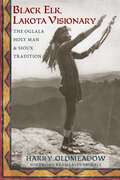
By Harry Oldmeadow. 2018
Black Elk (1863-1950), the Lakota holy man, is beloved by millions of readers around the world. The book Black Elk…
Speaks is the most widely-read Native American testimony of the last century and a key work in our understanding of American Indian traditions. In Black Elk, Lakota Visionary, Harry Oldmeadow draws on recently discovered sources and in-depth research to provide a major re-assessment of Black Elk&’s life and work. The author explores Black Elk&’s mystical visions, his controversial engagement with Catholicism, and his previously unrecognized attempts to preserve and revive ancestral Sioux beliefs and practices. Oldmeadow&’s lively and highly readable account also examines the controversies that have surrounded Black Elk and his collaborators, John G. Neihardt and Joseph Epes Brown. Oldmeadow judiciously explains why both Black Elk Speaks and The Sacred Pipe: Black Elk&’s Account of the Seven Rites of the Oglala Sioux are to be ranked amongst the most profound spiritual documents of the twentieth century. Black Elk, Lakota Visionary will command the attention of every reader who is interested in the American Indians, providing fascinating insights into their ancestral traditions prior to the reservation era, the subsequent destruction and revival of their traditional ways, and the vital lessons which the contemporary world might draw from their spiritual legacy.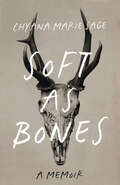
By Chyana Marie Sage. 2025
A poetic memoir as intricately woven as a dreamcatcher about overcoming the pain of generational trauma with the power of…
traditional healing In candid, incisive, and delicate prose, Chyana Marie Sage shares the pain of growing up with her father, a crack dealer who went to prison for molesting her older sister. In revisiting her family’s history, Chyana examines the legacy of generational abuse, which began with her father’s father, who was forcibly removed from his family by the residential schools and Sixties Scoop programs. Yet hers is also a story of hope, as it was the traditions of her people that saved her life, healing one small piece in the mosaic that makes up the dark past of colonialism shared by Indigenous people throughout Turtle Island.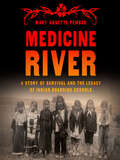
By Mary Annette Pember. 2025
A sweeping and deeply personal account of Native American boarding schools in the United States, and the legacy of abuse…
wrought by them in an attempt to destroy Native culture and life From the mid-nineteenth century to the late 1930s, tens of thousands of Native children were pulled from their tribal communities to attend boarding schools whose stated aim was to "save the Indian" by way of assimilation. In reality, these boarding schools—sponsored by the U.S. government, but often run by various religious orders with little to no regulation—were a calculated attempt to dismantle tribes by pulling apart Native families. Children were beaten for speaking their Native languages; denied food, clothing, and comfort; and forced to work menial jobs in terrible conditions, all while utterly deprived of love and affection. Amongst those thousands of children was Ojibwe journalist Mary Pember's mother, who was was sent to a boarding school in northern Wisconsin at age five. The trauma of her experience cast a pall over Pember's own childhood and her relationship with her mother. Highlighting both her mother's experience and the experiences of countless other students at such schools, their families, and their children, Medicine River paints a stark but hopeful portrait of communities still reckoning with the trauma of acculturation, religion, and abuse caused by the state. Through searing interviews and careful reporting, Pember traces the evolution and continued rebirth of Native cultures and nations in relation to the country that has been intent on eradicating them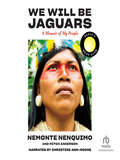
By Nemonte Nenquimo. 2024
FROM A FEARLESS, INTERNATIONALLY acclaimed activist comes an impassioned memoir about an Indigenous childhood, a clash of cultures, and the…
fight to protect the Amazon rainforest. Born into the Waorani tribe of Ecuador's Amazon rainforest-one of the last to be contacted by missionaries in the 1950s-Nemonte Nenquimo had a singular upbringing. She was taught about plant medicines, foraging, oral storytelling, and shamanism by her elders. At age fourteen, she left the forest for the first time to study with an evangelical missionary group in the city. Eventually, her ancestors began appearing in her dreams, pleading with her to return and embrace her own culture. She listened. Two decades later, Nemonte has emerged as one of the most forceful voices in climate-change activism. She has spearheaded the alliance of Indigenous nations across the Upper Amazon and led her people to a landmark victory against Big Oil, protecting more than a half million acres of primary rainforest. Her message is as sharp as a spear-honed by her experiences battling loggers, miners, oil companies, and missionaries. In We Will Be Jaguars, she partners with her partner, Mitch Anderson, founder of Amazon Frontlines, digging into generations of oral history, uprooting centuries of conquest, hacking away at racist notions of Indigenous peoples, and ultimately revealing a life story as rich, harsh, and vital as the Amazon rainforest herself. "Nemonte's writing is as provocative as it is inspiring, a heroine speaking her truth, which is exactly what we need to hear. Had we listened long ago to these voices, we wouldn't be in the eye of the storm now. "-Emma Thompson, actor and writer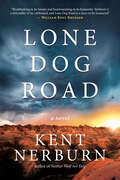
By Kent Nerburn. 2025
A tale of compassion and redemption from an award-winning author whose writing Louise Erdrich has praised as “storytelling with a…
greatness of heart” During the drought-stricken summer of 1950, two Lakota boys, ages eleven and six, huddle in a boxcar hurtling through the prairie night as they run from a government agent sent to take the younger boy to an Indian boarding school. But what begins as a pursuit soon becomes a complex drama of intersecting lives as the boys make their way across the vast Dakota plains to the pipestone quarries of western Minnesota to replace their great-grandfather’s channunpa, or sacred pipe, that was broken by the agent. Alive with a rich tapestry of characters the boys meet along their journey, this riveting story is at once an exploration of the hidden corners of the human heart and a moving study of the way the land shapes the people who live, love, dream, and die upon it. Sprawling yet intimate, Lone Dog Road is destined to take its place in the grand tradition of great American road novels.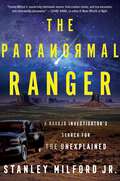
By Stanley Milford Jr.. 2024
*A NEW YORK TIMES PICK FOR TOP 22 NONFICTION BOOKS TO READ THIS FALL!*A Navajo Ranger’s chilling and clear-eyed memoir…
of his investigations into bizarre cases of the paranormal and unexplained in NavajolandAs a Native American with parents of both Navajo and Cherokee descent, Stanley Milford Jr. grew up in a world where the supernatural was both expected and taboo, where shapeshifters roamed, witchcraft was a thing to be feared, and children were taught not to whistle at night. In his youth, Milford never went looking for the paranormal, but it always seemed to find him. When he joined the fabled Navajo Rangers—a law enforcement branch of the Navajo Nation who are equal parts police officers, archeological conservationists, and historians—the paranormal became part of his job. Alongside addressing the mundane duties of overseeing the massive 27,000-square-mile reservation, Milford was assigned to utterly bizarre and shockingly frequent cases involving mysterious livestock mutilations, skinwalker and Bigfoot sightings, UFOs, and malicious hauntings.In The Paranormal Ranger, Milford recounts the stories of these cases from the clinical and deductive perspective of a law enforcement officer. Milford’s Native American worldview and investigative training collide to provide an eerie account of what logic dictates should not be possible.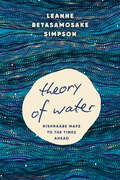
By Leanne Betasamosake Simpson. 2025
Acclaimed Nishnaabeg writer Leanne Betasamosake Simpson takes a revolutionary look at that most elemental force, water, and suggests a powerful…
path for the future.For many years, Leanne Betasamosake Simpson has found refuge in skiing—in all kinds of weather across different forms of terrain, often following the trail beside a beloved creek near her home. Recently, as she skimmed along this path and meditated on our world's uncertainty—including environmental devastation, the rise of authoritarianism, and the effects of ongoing social injustice—her mind turned to the ice beside her, and the snow beneath her feet. And she asked herself: What might it mean to truly listen to water? To know not only the land on which we live, but the water that surrounds and inhabits us? To coexist with and alongside water? So begins this renowned writer's quest to discover, understand, and trace the historical and cultural interactions of Indigenous peoples with water in all its forms. On her journey, she reflects on the teachings, traditions, stories, and creative work of others in her community—particularly those of her longtime friend Doug Williams, an Elder whose presence suffuses these pages; reads deeply the words of thinkers from other communities whose writing expands her own; and begins to shape a "Theory of Water" that reimagines relationships among all beings and life-forces. In this essential and inventive work, Simpson artfully weaves Nishnaabeg stories with her own thought and lived experience—and offers a vision of water as a catalyst for transformation, today and into our shared future.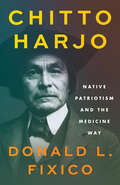
How a Mvskoke traditionalist leader forged a movement to resist the division of tribal lands and keep his people on…
the everlasting Medicine Way Chitto Harjo (&“Crazy Snake&”) had several names—Wilson Jones, Bill Jones, Bill Harjo, Bill Snake—and people called him many things: troublemaker, rebellion leader, uncivilized Indian, martyr, murderer. Many called him crazy for fighting against progress and for his commitment to traditions that they believed were outdated and dying out. Yet in the eyes of many Mvskokes and traditionalists of other nations, he was a hero, a defender of the old ways, a Native patriot, and a leader of the Medicine Way. These traditionalists believed in the Mvskoke worldview, which has inspired the Mvskokes and other Southeastern peoples to carry on their traditions as they have done for hundreds of years. In this engaging account, historian Donald L. Fixico tells the story of the Mvskoke people and their fight for survival and unity amid enduring tensions between white &“civilization&” and traditional culture. A personal story that begins with Fixico attending a Green Corn Ceremony with his father and young son, this engrossing narrative integrates traditional knowledge with historical method to present an Indigenous perspective on Mvskoke and Native American history.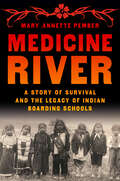
By Mary Annette Pember. 2025
A sweeping and trenchant exploration of the history of Native American boarding schools in the United States, and the legacy…
of abuse wrought by them in an attempt to destroy Native culture and life.From the mid-nineteenth century to the late 1930s, tens of thousands of Native children were pulled from their tribal communities to attend boarding schools whose stated aim was to "save the Indian" by way of assimilation. In reality, these boarding schools—sponsored by the U.S. government, but often run by various religious orders with little to no regulation—were a calculated attempt to dismantle tribes by pulling apart Native families. Children were beaten for speaking their Native languages; denied food, clothing, and comfort; and forced to work menial jobs in terrible conditions, all while utterly deprived of love and affection.Amongst those thousands of children was Ojibwe journalist Mary Pember's mother, who was was sent to a boarding school in northern Wisconsin at age five. The trauma of her experience cast a pall over Pember's own childhood and her relationship with her mother. Highlighting both her mother's experience and the experiences of countless other students at such schools, their families, and their children, Medicine River paints a stark but hopeful portrait of communities still reckoning with the trauma of acculturation, religion, and abuse caused by the state. Through searing interviews and careful reporting, Pember traces the evolution and continued rebirth of Native cultures and nations in relation to the country that has been intent on eradicating them.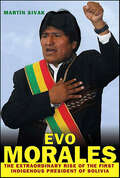
By Martín Sivak. 2008
The fascinating Bolivian president Evo Morales is vying with the brash and provocative leader of Venezuela, Hugo Chavez, to be…
the most influential figure in South American politics today. Since coming into office four years ago, Morales has been intensely critical of the United States, speaking out against the drug war at the United Nations and implementing socialist programs at home, including the nationalization of British Petroleum holdings and other foreign investments. And he has reached out to America's political enemies, including Cuba and Iran.Based on personal interviews and unprecedented access, Sivak traces the rise of Morales from his humble origins in a family of migrant workers to his youth as union organizer and explosion onto the national stage.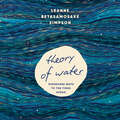
By Leanne Betasamosake Simpson. 2025
Acclaimed Nishnaabeg writer Leanne Betasamosake Simpson takes a revolutionary look at that most elemental force, water, and suggests a powerful…
path for the future.For many years, Leanne Betasamosake Simpson has found refuge in skiing—in all kinds of weather across different forms of terrain, often following the trail beside a beloved creek near her home. Recently, as she skimmed along this path and meditated on our world's uncertainty—including environmental devastation, the rise of authoritarianism, and the effects of ongoing social injustice—her mind turned to the ice beside her, and the snow beneath her feet. And she asked herself: What might it mean to truly listen to water? To know not only the land on which we live, but the water that surrounds and inhabits us? To coexist with and alongside water? So begins this renowned writer's quest to discover, understand, and trace the historical and cultural interactions of Indigenous peoples with water in all its forms. On her journey, she reflects on the teachings, traditions, stories, and creative work of others in her community—particularly those of her longtime friend Doug Williams, an Elder whose presence suffuses these pages; reads deeply the words of thinkers from other communities whose writing expands her own; and begins to shape a "Theory of Water" that reimagines relationships among all beings and life-forces. In this essential and inventive work, Simpson artfully weaves Nishnaabeg stories with her own thought and lived experience—and offers a vision of water as a catalyst for transformation, today and into our shared future.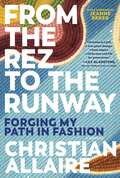
By Christian Allaire. 2025
Growing up on the Nipissing First Nation reserve in Northern Ontario, Christian Allaire wanted to work in the fashion industry,…
a future that seemed like a remote, and unlikely, dreamHe was first introduced to style and design through his culture’s traditional Ojibwe powwow regalia—ribbon skirts, beaded belts, elaborate headdresses. But as a teenager, he became transfixed by the high-fashion designs and runway shows that he saw on Fashion Television and in the pages of Vogue.His unwavering interest in fashion led him to complete a journalism degree so he could pursue his goal of becoming a full-time fashion writer. After landing his first big magazine job in New York City, Allaire found himself working at the epicentre of the international fashion industry. His dream had come true. Yet he soon realized the fashion world—and his place in it—wasn’t always quite as glamorous as he imagined it would be.From grinding as an unpaid intern, to becoming a glitzy (but overworked) fashion editor, Allaire writes with feeling about the struggle to find his place—and community—in the highly exclusive world of fashion. And he recounts, with great candour, the difficulty of balancing his ambitions with the often-inaccurate perceptions—including his own—of his culture’s place in the realm of fashion.Full of joy, honesty, adversity, and great clothes, From the Rez to the Runway is a gripping memoir about how to achieve your dreams—and elevate others—while always remaining true to yourself.
By Timothy Cochrane. 2023
An extraordinary illustrated biography of a Métis man and Anishinaabe woman navigating great changes in their homeland along the U.S.–Canada…
border in the early twentieth century John Linklater, of Anishinaabeg, Cree, and Scottish ancestry, and his wife, Tchi-Ki-Wis, of the Lac La Croix First Nation, lived in the canoe and border country of Ontario and Minnesota from the 1870s until the 1930s. During that time, the couple experienced radical upheavals in the Quetico–Superior region, including the cutting of white and red pine forests, the creation of Indian reserves/reservations and conservation areas, and the rise of towns, tourism, and mining. With broad geographical sweep, historical significance, and biographical depth, Making the Carry tells their story, overlooked for far too long.John Linklater, a renowned game warden and skilled woodsman, was also the bearer of traditional ecological knowledge and Indigenous heritage, both of which he was deeply committed to teaching others. He was sought by professors, newspaper reporters, museum personnel, and conservationists—among them Sigurd Olson, who considered Linklater a mentor. Tchi-Ki-Wis, an extraordinary craftswoman, made a sweeping array of necessary yet beautiful objects, from sled dog harnesses to moose calls to birch bark canoes. She was an expert weaver of large Anishinaabeg cedar bark mats with complicated geometric designs, a virtually lost art.Making the Carry traces the routes by which the couple came to live on Basswood Lake on the international border. John&’s Métis ancestors with deep Hudson&’s Bay Company roots originally came from Orkney Islands, Scotland, by way of Hudson Bay and Red River, or what is now Winnipeg. His family lived in Manitoba, northwest Ontario, northern Minnesota, and, in the case ofJohn and Tchi-Ki-Wis, on Isle Royale. A journey through little-known Canadian history, the book provides an intimate portrait of Métis people.Complete with rarely seen photographs of activities from dog mushing to guiding to lumbering, as well as of many objects made by Tchi-Ki-Wis, such as canoes, moccasins, and cedar mats, Making the Carry is a window on a traditional way of life and a restoration of two fascinating Indigenous people to their rightful place in our collective past.
By Staci Lola Drouillard. 2022
Part memoir, part cultural history, these memories of seven aunts holding home and family together tell a crucial, often overlooked…
story of women of the twentieth century They were German and English, Anishinaabe and French, born in the north woods and Midwestern farm country. They moved again and again, and they fought for each other when men turned mean, when money ran out, when babies—and there were so many—added more trouble but even more love. These are the aunties: Faye, who lived in California, and Lila, who lived just down the street; Doreen, who took on the bullies taunting her &“mixed-blood&” brothers and sisters; Gloria, who raised six children (no thanks to all of her &“stupid husbands&”); Betty, who left a marriage of indenture to a misogynistic southerner to find love and acceptance with a Norwegian logger; and Carol and Diane, who broke the warped molds of their own upbringing.From the fabric of these women&’s lives, Staci Lola Drouillard stitches a colorful quilt, its brightly patterned pieces as different as her aunties, yet alike in their warmth and spirit and resilience, their persistence in speaking for their generation. Seven Aunts is an inspired patchwork of memoir and reminiscence, poetry, testimony, love letters, and family lore. In this multifaceted, unconventional portrait, Drouillard summons ways of life largely lost to history, even as the possibilities created by these women live on. Unfolding against a personal view of the settler invasion of the Midwest by men who farmed and logged, fished and hunted and mined, it reveals the true heart and soul of that history: the lives of the women who held together family, home, and community—women who defied expectations and overwhelming odds to make a place in the world for the next generation.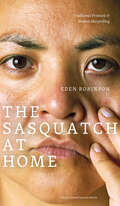
The award-winning Indigenous author of Monkey Beach shares tales from her family, her life, and her culture.In March 2010 the…
Canadian Literature Centre hosted award-winning novelist and storyteller Eden Robinson at the 4th annual Henry Kreisel Lecture. Robinson shared an intimate look into the intricacies of family, culture, and place through her talk, “The Sasquatch at Home.” Robinson’s disarming honesty and wry irony shine through her depictions of her and her mother’s trip to Graceland, the Potlatch where she and her sister received their Indian names, how her parents first met in Bella Bella (Waglisla, British Columbia) and a wilderness outing where she and her father try to get a look at b’gwus, the Sasquatch. Readers of memoir; Indigenous literatures, histories and cultures; and fans of Robinson’s delightful, poignant, sometimes quirky tales will love The Sasquatch at Home.“[Robinson] strikes sweetly at the commonality of people rather than narrowing in on cultural differences. The entire book is fast, colloquial, and engaging; concise enough to be read in one sitting, yet retaining the weightiness of a larger work. Its brevity makes it an ideal re-read and the second reading proves just as entertaining. The funny parts remain funny, the rendering of landscapes evocative and intimate, and the general themes stay relevant. Through rich and often comic dialogue and her painterly descriptions of the northwest landscape, Eden Robinson presents a glimpse into her community with the delicious, whispered quality of a well-told, yet well-protected, family story.” —Cara-Lyn Morgan, The Malahat Review, Winter 2011“Offers the reader a taste of her skill as a storyteller. The book is a tiny gem. . . . This brilliant little jewel, under fifty pages, offers readers a quick, but intense opportunity to experience the work of a rising Canadian writer. Like her novel, Monkey Beach, the accessibility of The Sasquatch at Home suggests its appropriateness for use in undergraduate courses. Above all, it is an essential acquisition for anyone with an interest in Pacific Northwest or Native Canadian studies, but it is also a find for those who just like a good story.” —Amy J. Ransom, American Review of Canadian Studies
By Null Anthony Wallace. 1969
This book tells the story of the late colonial and early reservation history of the Seneca Indians, and of the…
prophet Handsome Lake, his visions, and the moral and religious revitalization of an American Indian society that he and his followers achieved in the years around 1800.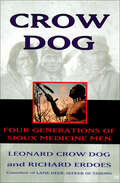
By Leonard C. Dog, Richard Erdoes. 1995
“Through the experiences of this family of great medicine men, readers are taken on an intimate journey through 120 years…
of Lakota history.” —Library Journal“I am Crow Dog. I am the fourth of that name. Crow Dogs have played a big part in the history of our tribe and in the history of all the Indian nations of the Great Plains during the last two hundred years. We are still making history.”Thus opens the extraordinary and epic account of a Native American clan. Here the authors, Leonard Crow Dog and Richard Erdoes (coauthor of Lakota Woman) tell a story that spans four generations and sweeps across two centuries of reckless deeds and heroic lives, and of degradation and survival.The first Crow Dog, Jerome, a contemporary of Sitting Bull and Crazy Horse, was a witness to the coming of white soldiers and settlers to the open Great Plains. His son, John Crow Dog, traveled with Buffalo Bill Cody’s Wild West Show. The third Crow Dog, Henry, helped introduce the peyote cult to the Sioux. And in the sixties and seventies, Crow Dog’s principal narrator, Leonard Crow Dog, took up the family’s political challenge through his involvement with the American Indian Movement (AIM). As a wichasha wakan, or medicine man, Leonard became AIM’s spiritual leader and renewed the banned ghost dance. Staunchly traditional, Leonard offers a rare glimpse of Lakota spiritual practices, describing the sun dance and many other rituals that are still central to Sioux life and culture. “An illuminating introduction to Sioux culture.” —Publishers Weekly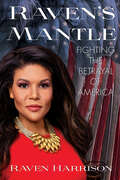
By Raven Harrison. 2023
The radio personality and political candidate chronicles her journey on the road to becoming the Conservative Warrior. Raven Harrison is…
a firebrand with an incredible military, business, and academic pedigree. As a scholar who left for college at age sixteen and the daughter of two retired United States Air Force lieutenant colonels, she recounts her awe-inspiring journey through communism, the Cold War, racism, and modern-day politics in a powerful story.Raven&’s Mantle is the striking firsthand account of her rise through some of the most pivotal moments in modern history. Raven details growing up in war zones, having a parent in the Pentagon on 9/11, and being injured in the 2017 Las Vegas Massacre. Raven&’s journey culminated in a life-changing event which catapulted her to the forefront of the fight for the soul of this nation and inspired her to run for Congress in her home state of Texas. Raven, a Native American black woman, was raised by fighters who instilled in her that &“Freedom is never free.&” Now, she&’s taking on the ills of society for a better America. Raised by patriots. Called by God. Deterred by nothing. Raven Harrison is the Conservative Warrior!&“Today [Harrison] is fast becoming one of the most respected conservative voices in America. Whether through her regular appearances on FOX News, radio stations across the country, her podcast, her speaking engagements, her social media outreach that touches millions or this book . . . Raven is someone who says what she means, does what she says and gets things done. I am proud to call her my friend, and I can&’t wait to see what she does next.&” —Sid Miller, Commissioner of the Texas Department of Agriculture and Former Member of the Texas House of Representatives
By Cory Franklin. 2015
An inside look at one of the nation's most famous public hospitals, Cook County, as seen through the eyes of…
its longtime Director of Intensive Care, Dr. Cory Franklin. Filled with stories of strange medical cases and unforgettable patients culled from a thirty-year career in medicine, Cook County ICU offers readers a peek into the inner workings of a hospital. Author Dr. Cory Franklin, who headed the hospital’s intensive care unit from the 1970s through the 1990s, shares his most unique and bizarre experiences, including the deadly Chicago heat wave of 1995, treating some of the first AIDS patients in the country before the disease was diagnosed, the nurse with rare Munchausen syndrome, the first surviving ricin victim, and the famous professor whose Parkinson’s disease hid the effects of the wrong medication. Surprising, darkly humorous, heartwarming, and sometimes tragic, these stories provide a big-picture look at how the practice of medicine has changed over the years, making it an enjoyable read for patients, doctors, and anyone with an interest in medicine.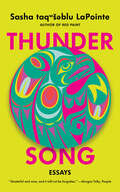
By Null Sasha LaPointe. 2024
Longlisted for the Carnegie Medal for Excellence"Blending beautiful family history with her own personal memories, LaPointe&’s writing is a ballad…
against amnesia, and a call to action for healing, for decolonization, for hope." —ElleThe author of the award-winning memoir Red Paint returns with a razor-sharp, clear-eyed collection of essays on what it means to be a proudly queer indigenous woman in the United States todayDrawing on a rich family archive as well as the anthropological work of her late great-grandmother, Sasha taqʷšəblu LaPointe explores themes ranging from indigenous identity and stereotypes to cultural displacement and environmental degradation to understand what our experiences teach us about the power of community, commitment, and conscientious honesty.Unapologetically punk, the essays in Thunder Song segue from the miraculous to the mundane, from the spiritual to the physical, as they examine the role of art—in particular music—and community in helping a new generation of indigenous people claim the strength of their heritage while defining their own path in the contemporary world.